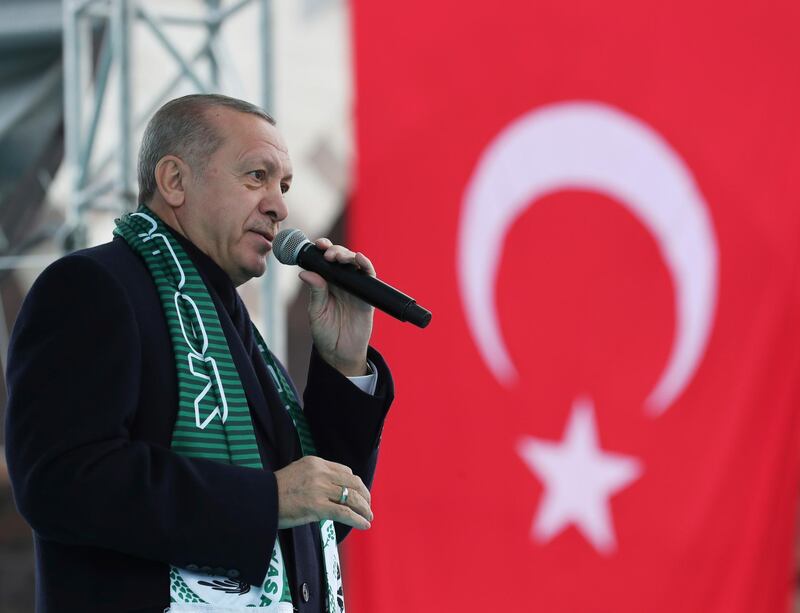Turkey may start a new military operation in Syria at any moment, President Tayyip Erdogan said on Monday, touting support from US President Donald Trump even though the Pentagon has issued a stern warning to Ankara.
Last week, the Pentagon said unilateral military action by any party in northeast Syria, where US forces operate, would be unacceptable.
But Mr Erdogan suggested that Mr Trump was more receptive to Turkish plans to move east of the Euphrates river than his own US Department of Defence.
"We officially announced that we will start a military operation to the east of the Euphrates," Mr Mr Erdogan said in a speech in the central province of Konya. "We discussed this with Mr Trump and he gave a positive response."
The White House did not respond to requests for comment on Mr Erdogan's assertion but last Friday acknowledged that Messrs Trump and Erdogan spoke about Syria during a telephone conversation.
"Given the [Turkish] threats of marching in to deal with this problem themselves, the US, at every level has reached out to the Turks," said Ambassador James Jeffrey, the special US envoy for Syria engagement.
Mr Jeffrey added that he believed the situation had "calmed somewhat."
"I believe that we're willing to work with the Turks and with the people on the ground to find a way forward," he told a forum at the Atlantic Council think tank in Washington.
Turkey and the United States have long been at odds over Syria policy, where Washington has backed the Syrian Kurdish YPG militia against ISIS. Ankara considers the YPG a terrorist organisation tied to the Kurdistan Workers' Party (PKK), an outlawed group that has waged a three-decade insurgency in southeast Turkey.
Mr Erdogan said last week that Ankara would launch a new campaign within days against the YPG, although he has yet to give a more definitive timeline.
Any new campaign is likely to be complicated by the presence of US soldiers in northern Syria, who have established observation posts along the Turkey-Syria border in a failed effort to assuage Turkish security concerns.
Washington has communicated the positions of those observation posts to Ankara, and warned that American forces will defend themselves if fired upon, officials told Reuters.
The Pentagon on Monday denied reports that it was sending reinforcements to the border, in a sign that it is comfortable with the risk level to US troops even as Ankara heightens the threat of military action.
"We do not have a major military movement of forces to the northeast border with Syria," said Pentagon spokesman Colonel Rob Manning. "We've got nothing more than what is required to continue our mission at those [observation posts]."
Turkey has already intervened to sweep YPG and ISIS fighters from territory west of the Euphrates over the past two years. It has not gone east of river, partly to avoid direct confrontation with US forces. The Pentagon says it has about 2,000 troops in Syria.
"We can start our operations on Syrian soil at any time from locations that suit our planning. Our heroic army has completed its preparations and plans. As I always say, we may come suddenly one night," Mr Erdogan said on Monday.
Mr Erdogan did not elaborate on Mr Trump's response, but said Turkey would take care to avoid American casualties.
A source familiar with the Syria issue said Mr Erdogan was urged by the administration to refrain from a military incursion into Syria's Manbij, a town just west of the Euphrates river held by the YPG, and was warned that the United States would defend itself if threatened.
However, Mr Erdogan has said Turkish forces will enter Manbij if the United States does not remove YPG fighters from the town, including targeting the eastern side where the YPG controls an area of more than 400 kilometres along the border towards Iraq.
Manbij is near an area where Turkish and US troops began joint patrols last month. That cooperation has also been complicated as Turkey has shelled Kurdish fighters to the east of the Euphrates.
The shelling prompted the United States to set up observation posts on the border between Kurdish-held northern Syria and Turkey.
_____________
Read more:
Sudan president lands in Syria in first visit by Arab leader
ISIS entering 'end days' as SDF takes last town
Car bombing kills 8 in Syria's Afrin
______________
Mr Erdogan's comments appeared to be more conciliatory than those of his interior minister Suleyman Soylu, who earlier accused Washington of attempting to stymie Turkey's efforts against the YPG over the last two years.
"The United States thought it could deter us with the men it has nurtured," Mr Soylu said during a visit to Pakistan, state-owned news agency Anadolu reported. "Now, they will try to hold us back east of the Euphrates. Turkey did not, and will not, allow that."
A spokesman for the Turkey-backed National Army rebel group in Syria said it would ignore a request from Washington to stay out of a campaign east of the Euphrates. "We have chosen to stand side by side with [Turkey]," Major Youssef Hamoud said.
Separately, Ankara has kept up regular air strikes against PKK militants based in Iraq's mountains. Baghdad summoned Turkey's ambassador on Friday after Ankara said it killed eight PKK fighters. But Turkish warplanes have since carried out further strikes.





